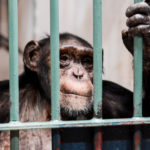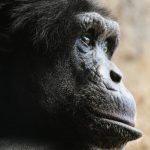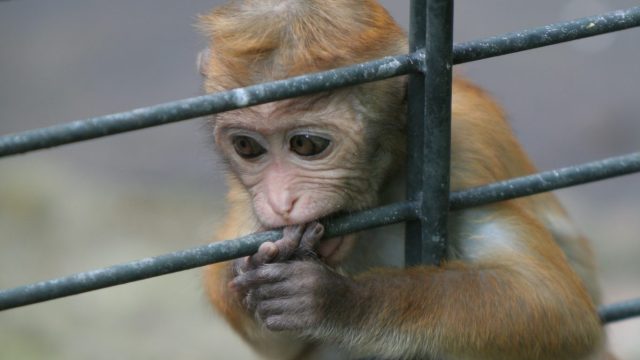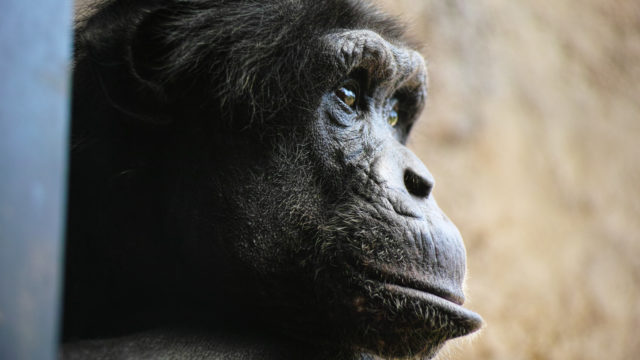
Compelling the USDA to Protect Primates Used in Research
New England Anti-Vivisection Society v. Goldentyer
The Animal Legal Defense Fund filed a lawsuit against the USDA for failure to protect the psychological well-being of primates used in biomedical research.
Status
Next Step
In July 2020, the Animal Legal Defense Fund, New England Anti-Vivisection Society, and the International Primate Protection League filed a lawsuit against the United States Department of Agriculture (USDA) for failure to protect primates used in biomedical research. The coalition is represented by Harvard Law School’s Animal Law and Policy Clinic.
The lawsuit, filed in the United States District Court for the District of Maryland, follows the USDA’s rejection of a 2014 petition by the animal protection groups asking the USDA to promulgate specific standards for the psychological well-being of all non-human primates similar to those adopted a year earlier in 2013 by its sister agency, the National Institutes of Health (NIH), for chimpanzees used in federally funded research. The Animal Welfare Act was amended in 1985 to require the USDA to promulgate standards that promote “the psychological well-being” of primates.
Current regulations were last updated in 1991, when much less was known about the psychological needs of primates. These regulations defer to research facilities to develop their own enrichment plans, and have been criticized by the USDA’s own inspectors as vague and unenforceable. The regulations fall far short of what the NIH concluded was necessary to protect the psychological well-being of chimpanzees.
The lawsuit seeks to protect the tens of thousands of other primates—macaques, marmosets, and baboons—used in research in this country.
Who is being sued, why, and under what law? Sonny Perdue, the Secretary of the United States Department of Agriculture (USDA) and Elizabeth Goldentyer, the Acting Deputy Administrator for Animal Care at The Animal and Plant Health Inspection Service (APHIS), are being sued under the Administrative Procedure Act for rejecting the 2014 petition calling on the USDA to promulgate better standards for the psychological well-being of non-human primates.
Why this case is important: Nonhuman primates, such as apes and monkeys, are highly intelligent animals with complex psychological and physical needs. But current regulations do not impose specific standards for a physical environment that is adequate to ensure the psychological well-being of nonhuman primates used in research. As one participant at an NIH-sponsored Symposium on Animal Welfare and Scientific Research lamented, “[i]f you show a picture of a primate cage from 40 years ago and a primate cage now, it’s basically the same: it’s all metal with a perch added.”
The requested regulations are necessary to provide all nonhuman primates used in research the environmental enrichment they need — and to establish clear, specific standards that can be uniformly implemented and enforced by the USDA across research institutions as required by the AWA.
Donate to Protect Animals
Help animals win the legal protections they so desperately need and deserve, and ensure they have an advocate in courtrooms and legislatures across the country.
Recent News
-
CDC Seeks to End Program Using Monkeys in Research
The Animal Legal Defense Fund continues to advocate for animals suffering in research labsDecember 8, 2025 News -
Washington Governor Signs Animal Protection Bills into Law
The four laws will offer better protections for companion animals and keep wild animals from being exploited for entertainment in the stateMay 16, 2025 News -
Captive Primate Safety Act Reintroduced in the U.S. House to Protect Nonhuman Primates
Bill will prohibit the type of private possession of nonhuman primates portrayed in the HBO Max docuseries “Chimp Crazy”May 6, 2025 Press Release
Related Cases
-
Urging USDA to Revoke AWA Exhibitor License from Jason Clay (2024)
Complaint to USDA submitted on February 27, 2024
-
Lawsuit to Force USDA to Recognize Its Authority to Take Possession of Animals Upon License Revocation
Animal Legal Defense Fund v. USDA
Looking for case and legal resources? View Resources
See More






